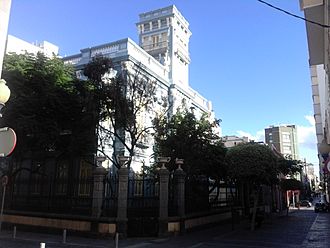Palacete Rodriguez Quegles facts for kids
Quick facts for kids Palacete Rodríguez Quegles |
|
|---|---|

Palacete Rodríguez Quegles, 4 November 2016
|
|
| General information | |
| Type | Mansion / Small palace |
| Town or city | Las Palmas, Gran Canaria, Spain |
| Coordinates | 28°06′20″N 15°25′06″W / 28.105657°N 15.418439°W |
| Completed | 1900 |
| Design and construction | |
| Architect | Mariano Belmás Estrada, Fernando Navarro y Navarro |
| Designations | Monument ARI-51-0007111-00000 |
The Palacete Rodríguez Quegles is a beautiful old mansion, or small palace. It is located in Las Palmas, the main city on Gran Canaria island in Spain.
This special building was finished around 1901. It was built as a grand home for a wealthy businessman. Later, in 1972, the city of Las Palmas bought it. It was used as a music school for some time. Today, after being carefully fixed up, the Palacete is a busy cultural center.
Contents
Building a Dream Home
The Palacete Rodríguez Quegles stands on a corner where Pérez Galdós and Perdomo streets meet. This spot used to be an orchard for an old monastery.
Juan Rodríguez Quegles was a very successful businessman and lawyer. He was born on the island of Fuerteventura. Later, he moved to Gran Canaria, where he managed many large businesses. He really loved European culture and art.
He wanted to build a magnificent palace as a special gift for his wife, María Teresa González Díaz. He had promised her the most beautiful house in the city.
Design and Style
The palace was designed in the modernist style. This was a popular art and design movement around that time. The first architect chosen was Mariano Belmás Estrada from Madrid.
Belmás worked with Fernando Navarro y Navarro. Eventually, Navarro took over and completed the project. Construction began in 1900. The exact year it was finished is not known.
The finished mansion had a mix of different styles. This "eclectic" look, combining foreign architectural and decorative ideas, was common for wealthy people back then. It is one of the most interesting buildings in the Triana neighborhood of Las Palmas.
What the Palace Was Used For
Over the years, society and the economy changed. It became hard for the family of Rodríguez Quegles to keep up the large building. It looked like the palace might fall apart.
In 1972, the City Council of Las Palmas de Gran Canaria bought the building. They wanted to use it for the Higher Conservatory of Music. The palace was changed to fit the needs of a music school.
After 16 years, the school had too many students for the building. So, the palace was closed again.
Restoration and New Life
In 1990, the City Council gave the building to the Canary Islands Ministry of Culture. They started a big project to restore the palace. During this work, they found hidden treasures. These included Venetian stucco, beautiful wall paintings (frescoes), tapestries, and marble. Everything was carefully brought back to its original look.
Workers restoring the outside of the building had a challenge. They had to ask older neighbors to remember that the palace had originally been green!
On September 12, 1991, the palace was officially named a historical-artistic monument. This means it is a very important building for culture and history.
The Palace Today
After its restoration, the palace was used by different government groups. These included the Ministry of Education and Culture and the Canary Islands Academy of Language.
Today, the Palacete Rodríguez Quegles is a lively cultural center. It is used for art exhibitions and to organize cultural events in the city. This is part of the City Council's CreActiva project.
As of 2020, it was also the main office for the Las Palmas de Gran Canaria International Film Festival. It also housed the Philharmonic Society.
See also
 In Spanish: Palacete Rodríguez Quegles para niños
In Spanish: Palacete Rodríguez Quegles para niños
 | Anna J. Cooper |
 | Mary McLeod Bethune |
 | Lillie Mae Bradford |

